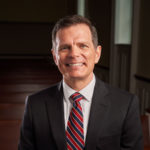
Keep It Simple
When new seminarians first begin their theological education I suspect they are overwhelmed with the tidal wave of new terminology that comes their way. Terms like eschatological, supralapsarian, kenotic christology, hapax legomenon, merism, and the like come flooding in and incites fear in the most intellectually stout-hearted students. In fact, when I first began reading Calvin’s Institutes I kept a running list of words I did not know with a one-word definition so I could better understand what I was reading. One of the first books I bought was concise theological dictionary because I kept on running into words I didn’t know or understand. The longer a student gets pickled in these new terms, the more accustomed she becomes to knowing and using them, which is a good thing. It means that you’re growing in your understanding of the discipline of theology, but there is also a drawback.As important as it is to learn theological terminology, the last thing you want to do is misuse it. Click To Tweet
As important as it is to learn theological terminology, the last thing you want to do is misuse it. It’s one thing if you’re talking with your fellow students, a professor, or if you’re talking with another minister. They will understand your terminological short-hand and think nothing of your use of it. If, on the other hand, you’re talking with a lay person, or you’re preaching from the pulpit, your use of theological terminology can be an obstacle. Colleagues of mine once chuckled that one of their former professors said “eschatological” in a brief twenty-minute chapel address more than two-dozen times. They know because they counted each time the professor said the word. While you might get away with this term in a seminary chapel address, the same can’t be said for a sermon on Sunday morning.
Even with people who have been in the church for years, are biblically literate, and mature, their faith can nevertheless be simple and unencumbered by heavy-duty terminology. When you’re preaching or teaching, therefore, don’t imagine that your congregation or class is full of theology students or professors, but rather it’s filled with plumbers, moms, grandmothers and grandfathers. In other words, it’s filled with ordinary people who love God’s word but might not know many technical theological terms. When you teach about eschatology, for example, tell your church that you’re discussing the new heavens and earth, eternal life, or heaven. People understand these biblical terms. This doesn’t mean, of course, that you should never use technical terms. You should first define and explain them, and then you can use them. But even then, beware of using them too much because there will always be people who won’t understand what you’re saying. You don’t want to put up unnecessary obstacles to people’s ability to grasp and comprehend your teaching and preaching. Keep your message accessible and unhindered by unnecessary intellectual barriers.
This post was originally published on Dr. Fesko’s blog.

